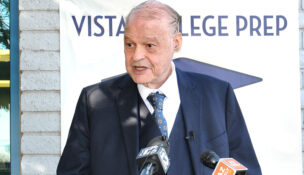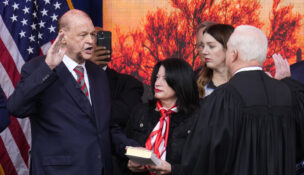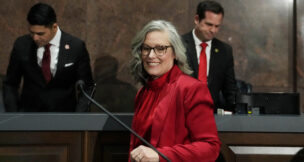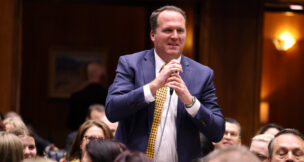House Appropriations passes Proposition 123 measure, paves way for future teacher pay increase
Kiera Riley Arizona Capitol Times//June 17, 2025//
House Appropriations passes Proposition 123 measure, paves way for future teacher pay increase
Kiera Riley Arizona Capitol Times//June 17, 2025//
Editor’s note: Updated June 20, 2025 at 9:20 a.m.
Key Points:
-
House Appropriations passed another standard set of Proposition 123 measures
-
School choice protections and charter deregulation could come as amendments
-
Republicans have not expressed unconditional support, Democrats still opposed
Another House plan for Proposition 123 got a start in the House Appropriations committee this week, with school choice protections and provisions to deregulate charter schools rumored to be coming down the pike.
But whether a final proposal will make it through remains to be seen, especially given shaky Republican support in committee and no Senate proposal on the calendar as of June 19.
A milquetoast version of Prop. 123 — with provisions maintaining the same distribution rate for ten years and earmarking funds for pay raises for eligible teachers — passed through the House Appropriations Committee on June 17.
However, in committee, lawmakers commented on proposals to deregulate charter schools and to protect the Empowerment Scholarship Account program, which may be introduced via an amendment when the bills move to the Committee of the Whole.
Movement on Prop. 123 is surprising after lawmakers placed it on the proverbial backburner as all eyes moved to the budget. But, with budget movement in both chambers, the majority seem to be making a last ditch effort to see the education funding measure through.
One measure, proposed by Rep. Matt Gress, R-Scottsdale, was slated to go before the Committee of the Whole, but was retained on the calendar. Meanwhile, two new measures — transmitted through strike-everything amendments — passed the House Appropriations Committee.
Gress, the lead in the House on Prop. 123, was absent from the House Appropriations Committee. Livingston took the helm instead.
House Concurrent Resolutions 2031 and 2058 set the distribution rate at 6.9% for the next ten years to raise pay for teachers who spend the majority of their time in the classroom and meet or exceed performance requirements, with the proposition slated to appear on the ballot in the general election of 2026.
Rep. Walt Blackman, R-Snowflake, questioned whether the proposal included provisions to deregulate charter schools.
Though the proposal before the committee did not, Livingston later said there could likely be amendments in the future, though he could not say whether the proposals to deregulate charter schools and protect ESAs by writing them into the Constitution would be put through.
Education groups remain opposed to the bill as it currently stands.
Rebecca Bebee, lobbyist for the Arizona School Administrators Association, said the proposal presents a limited definition of a teacher and requires the same amount to be allocated to each teacher, regardless of their teaching experience.
“It limits the ability for schools to do what they feel is right with the educators they have on campus,” Beebe said.
Marisol Garcia, president of the Arizona Education Association, said the organization still opposes making pay raises contingent on teacher evaluations, noting a misalignment in requiring salary increases while basing the pay raise on evaluations, which are more akin to a bonus.
The AEA also opposes the lack of support for education support personnel.
When the resolutions went up for a vote, Republicans failed to show unconditional support for the measure.
Blackman voted yes, but said if the proposal ended up including any provisions to deregulate charter schools, or “anything to do with not holding charter schools and private schools to the same standards as public schools,” he would vote no.
He continued by noting his fear of schools being able to turn away students with disabilities.
“Our job in the Constitution is to educate our children. In the rural areas, that would hurt our kids,” Blackman said. “You’re hurting more than just these kids, you’re hurting these parents who can’t find a place for their children.”
Rep. Chris Lopez agreed with Blackman. And, Rep. Justin Olson reserved the right to a future no-vote based on the 6.9% distribution rate, advocating instead for a 5% rate.
Democrats aligned with public education groups highlighted points of opposition and, again, stressed the fear of future deregulation and protection for school choice programs.
“I truly do not believe that this is the version that will come up for a vote,” Rep. Nancy Gutierrez said.
Despite no provisions covering school choice, Livingston voted yes with his comments revolving around his desire to bolster parental and school choice and find ways to build more charter and private schools in rural districts.
School choice advocates attended the hearing but did not speak or otherwise comment on Proposition 123. The Arizona Charter Schools Association did not respond to a request for comment.
Though it jumped one hurdle in committee, a final Prop. 123 plan still has a way to go as the Senate has yet to advance or revive a final resolution as of June 19.
Sen. J.D. Mesnard is leading the Republican effort to shepherd a proposal through the Senate. He said he was not entirely sure what would come of Proposition 123 after the House took some initial steps.
In his chamber, no updated language has come to pass, but Mesnard previously told the Arizona Capitol Times that the latest proposal would operate off a 6.9% distribution rate, with 4.5% made permanent and 2.4% lapsing in ten years.
Teachers would be eligible for a roughly $4,000 raise and would still have to spend the majority of their time on classroom instruction and meet or exceed performance benchmarks. He too was tooling with school choice protections.
If the measure fails to make it through this session, there is always the next, as lawmakers backfill any funds from Proposition 123 and look to the 2026 general election.
“Whether or not it goes the distance, or we’re able to sync up totally in the remaining short amount of time we have, I think remains to be seen,” Mesnard said. “Right now, the best way to view it is trying to keep all the options and pathways on the table in the final days of the session.”














































